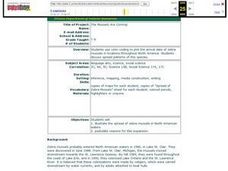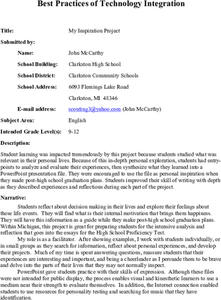Curated OER
Trees: Are They Thriving or Surviving?
For this trees survival lesson plan, 8th graders discuss what trees need to grow, brainstorm things that could adversely affect tree growth, and compare characteristics of thriving trees vs. surviving trees. Students learn about the...
Michigan Sea Grant
Exploring Watersheds
Collaboratively, students partake in a hands-on activity in which they build models of a watershed. Each group member draws an elevation map—a bird's eye view—of their model and predicts how water will flow from the high to low points....
Curated OER
I Hear an "A"
Students explore the long "a" sound. Using the Michigan quarter reverse design, students say the words aloud to discover the long "a" sound. Students read given words and identify the long "a."
Curated OER
The Mussels Are Coming
Students work together to identify and describe the various types of mussels. Using a color-coded system, they plot the arrival date of zebra mussels in North American waters. They discuss the increase in their population with the class.
Scholastic
Perfect Postcards: Illinois
Connect the geography and history of Illinois using an art-centered lesson on the railroads. The railroad connected once-distant places, particularly in the Midwest. Using research, class members create postcards of fictional cross-state...
Michigan Sea Grant
Wetlands
Wetlands may not sound particularly ornate, but they are as important as any habitat! With a hands-on activity, young scientists build a wetland model and observe its many functions in action. They discover the importance of wetlands to...
Curated OER
Rising Temperatures Threaten Penguins
Learners examine the continent of Antarctica, then read a news article about the decline in the Antarctic penguin population. In this current events lesson, the teacher introduces the article with a discussion and vocabulary activity,...
Curated OER
Getting a Sense of Time
Young scholars gain an appreciation for geologic and historic time. They gain a general amount of information of the development of hte Chicago area, with particular attention given to the role of the Chicago River. Students contruct a...
Curated OER
Non Native Species: English Ivy-Landscape Plant or Deadly Killer?
Students study the impact that invasive species have on biodiversity and more natural areas.
Curated OER
Discover a Pond Food Web
Young scholars study the biodiversity of animal life in a pond. They investigate the interdependence between pond organisms by completing a pond dipping activity and completing a checklist.
Curated OER
Major American Water Routes
Sixth graders locate and identify the major bodies of water and waterways in the United States. Through a simulation activity, they describe how early explorers would have described their surroundings. Working in groups, they create...
Curated OER
Canadian Studies Exercise
In this Canadian history worksheet, 6th graders review many aspects of Canadian studies. Students complete 10 fill in the blank questions, 5 essay questions and 10 true/false questions.
Curated OER
Mystery State #51
In this mystery state worksheet, students answer five clues to identify the state in question. They then locate that state on a map.
Curated OER
Our Forest is Changing
Students read a story and solve a problem about an unhealthy population of trees. In this forest lesson students study tree disease and then research it online and present what they found.
Curated OER
Jim Frankoski Lesson Plan Ideas
Students read about Jim Frankoski and his art to examine various elements in environmental art. For this art analysis lesson, students analyze the location of photographs and how images create illusions that capture new viewpoints.
Curated OER
My Inspiration Project
Students reflect about decision making in their lives and explore their feelings about these life events. They create 100 word narratives and poems with specific details then create Power Point presentations of their project.
Curated OER
My Inspiration Project
Learners explore what is very relevant in their personal lives during this project. They reflect upon past experiences and are encouraged to investigate what their post-high school graduation plans are.
University of Michigan
Michigan Sea Grant: Teaching Great Lakes Science: Fish Identification
For this lesson, students examine the physical characteristics of fish that live in the Great Lakes and identify common features that help species to survive in that environment. Downloadable resources include a fish poster, fish family...
National Endowment for the Humanities
Neh: Edsit Ement: Anishinabe Ojibwe Chippewa: Culture
Though written for grades 3-5, this lesson plan can be easily changed to help students of all ages learn about the Chippewa people. Additional resources provide historical, cultural, and geographical facts concerning this Native American...




















